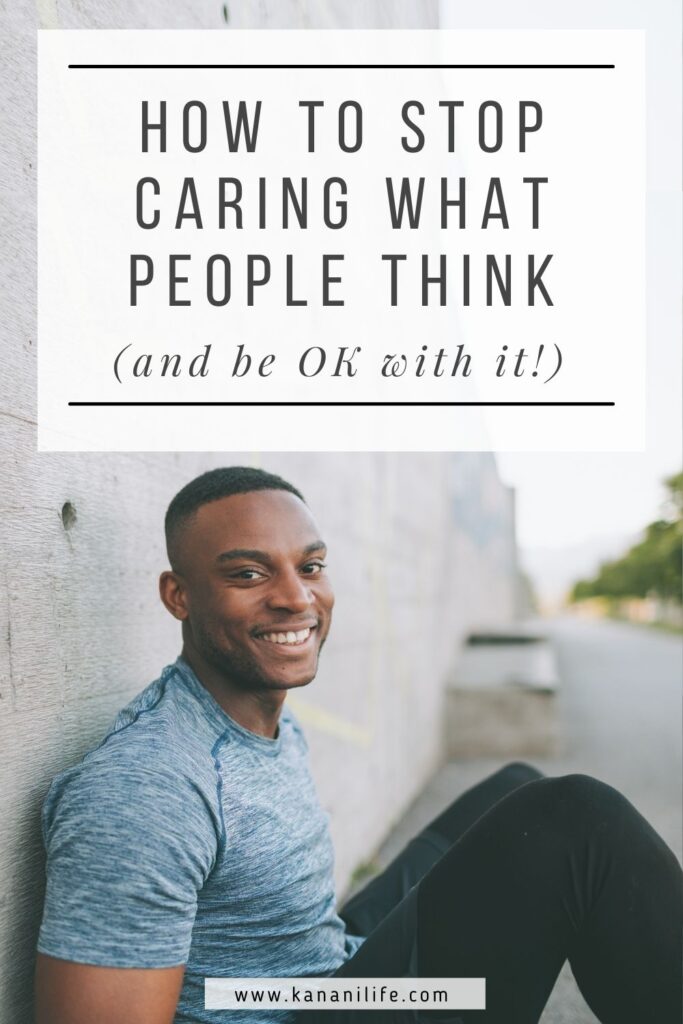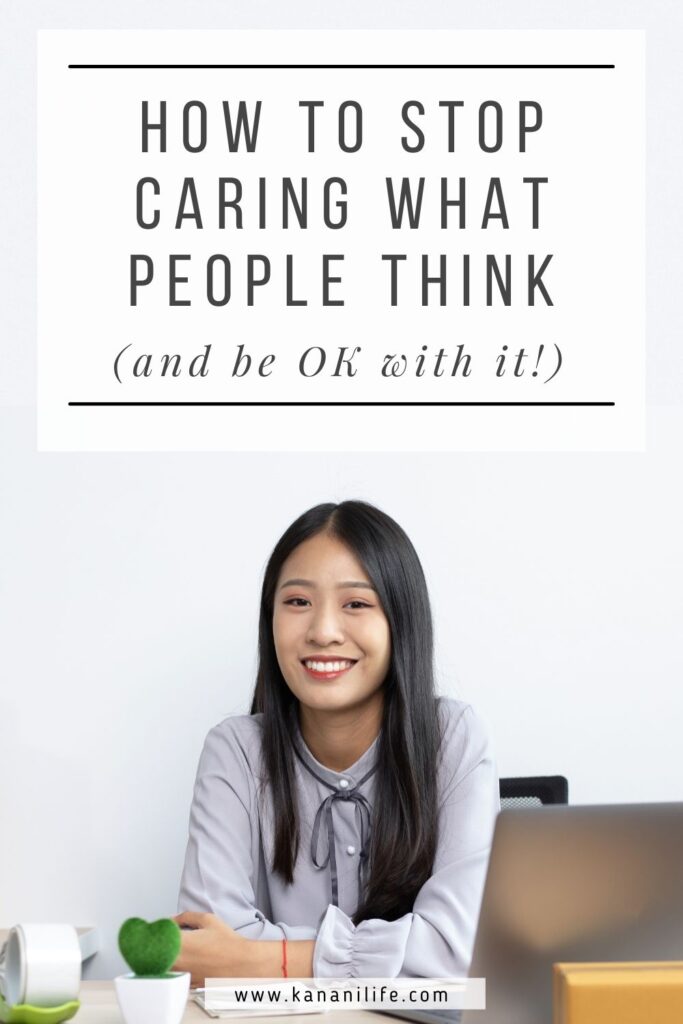
It’s time to stop caring what people think. Too often we stop ourselves from making a change or taking a risk because we worry about what others will think of us. It’s a deep seated fear that everyone has, but it can be worked through and possibly even overcome. Whether you want to reach a dream, start something new, start a relationship, or make any kind of life change, it’s easy to care what other people think. It’s easy to ask, “Will they think I’m weird?” or “This isn’t what people normally do, so will they judge me?” or “What if I fail?”
By the end of this article, you should have a handy toolbox of ways to stop caring what people think. You’ll learn why you care about other people’s opinions, how to process and overcome false beliefs, and then see how and why you should stop caring what people think about you.
My experience
I’ve always been pretty independent and responsible, knowing that if I made a mistake, I was completely accountable for it. It helped me not care what people thought of me, and pulled me away from people-pleasing tendencies I had developed as a child. I used to walk on eggshells around family members until I became a young adult. And then the realization hit me… I don’t want to live my life like this.
I don’t want others to dictate what I do because I’m afraid of what they’ll say about or to me. It’s living out of fear, not love. So I started doing more of what I wanted to do. It’s a journey to get out of people-pleasing tendencies. When I self-published my first book, Aloha State of Mind, I made a goal. That goal was: I’m not going to care what people think. Since then I’ve learned some tips along the way and hope this will help you on your journey. You gain so much by doing your thing and having joy in it, instead of worrying about other’s opinions. So grab something for notes and let’s dive right in!
Recognize people-pleasing behaviors
Many of us care what people think because we grew up as people-pleasers. I don’t think parents try to do this to kids, but whenever a child messes up—as they will—parents might get angry and respond in a way that tells the child, “If you do ____, I’ll get mad.” Kids don’t want their parents to react negatively and be mad at them, so they quickly learn to people please. They walk on eggshells around their parents, hoping that whatever they do will please the parent.
This behavior continues, usually subconsciously, until we’re much older and realize we don’t need to please people. We are responsible for our own actions, and not other people. And sometimes, our actions might be disagreeable to people, even if we do all we can to be peaceful and helpful.
I suggest looking back at your own childhood and upbringing. Do you notice patterns of people-pleasing? Would you act a certain way or do certain things to please your parents? Has that pattern continued to the present day with other relationships? Look for these patterns and make a conscious decision to stop it. It’s easier than it sounds, I know, but even just the act of recognizing people-pleasing patterns will help your mind see red flags in your relationships or the way you interact with others.
What do you have to lose? Would you regret not trying that thing? Why live a “normal” life anyways?

If there’s something you always wanted to do, but you’re worried about what other people think, just remember that other people’s opinion of you do not matter. The most important opinion of you is your own opinion and God’s opinion. I truly believe that each of us have amazing opportunities, calling, missions, and purposes, but we stop ourselves short because we’re afraid of other people’s opinions. But what if we reframed our perspective to: What does God think of me? What do I think of myself?
If you know you’re called or meant to do something, and you and God are rooting for you, then it literally doesn’t matter what others think. We often see people on social media living their dreams or doing out-of-the-ordinary things and think, I wish I could do that. But what if you could? The people on social media had to learn to not care what other people thought of their risks, differences, or sacrifices. Everyone starts somewhere, so why not start now?
What do you have to lose?
Maybe some people will look at you weird but who cares? Are they working towards their dreams? (Probably not).
Would you regret not trying that thing? Say, for example, you want to start a YouTube channel, but you’re afraid what others will think of you. Would you be sad if years from now you look back and wonder where you’d be if you just started the YouTube channel? Try it out, see if you like it. And if it doesn’t work out, at least you learned and can live without any regrets. You put in your all, and people can judge all they want.
Finally, why live a normal life anyways? A huge percentage of the American population will work 9-5 jobs their entire lives. They’ll live typical lives, and that’s ok. But if you’re wanting to pursue something that’s considered “not normal” in comparison to the “9-5, save, and retire plan,” then why let someone else’s opinion stop you? Why live a normal life, when you can live the life you dreamed of? And why let people’s opinions stop you? Your dreams, creativity, and ideas are valid, and they deserve to come to life, even if your path is considered “not normal.”
People will judge either way so stop caring what people think
I hate to say this but it’s true: people will judge you either way, so you might as well live your best creative life and go for it. People will love what you’re doing, be indifferent, or they’ll hate it, and it’s something you’ll have to learn to live with. You literally cannot please everyone, and it’s just a fact of life.
Even if you are cringe, are you having fun and enjoying yourself?

Whenever you start something new, there will be kinks to work out. You probably won’t be perfect at it. Your first YouTube video might be awkward. The first project might be a flop. The debut novel might not be a bestseller. But it’s ok because the question is: are you having fun and enjoying yourself?
If you enjoy what you’re doing and having fun, then it really doesn’t matter what others think (of course, as long as what you’re doing is not causing harm or putting other’s safety at risk)! Work will still be work. Risks will still be risks. Sacrifices will still be sacrifices. But if you love what you do, and you’re enjoying the process and learning curve, then know you’re in the right place. You might be cringe to family members, friends, or people on social media, but there’s someone out there who loves what you’re doing. And guess what? They’ll come to you because of your natural enthusiasm, joy, and love of whatever you’re doing.
It’s ok to say no
People pleasers say yes to everything, including things they probably don’t want to do. When I was younger, I was at a youth leader’s house and she had a sign that said, “Stress is when your mind says no and your mouth says ‘yes.’” So true! A part of not caring about what people think is learning to care more about what YOU think, what God thinks, and listening to yourself and God. I believe God inspires us to do stuff, but we have to put in the effort and make things happen.
And saying NO is actually saying YES to something else. For example, if someone asks you to do something for them, if you say yes (and don’t really want to do it), you’re saying no to doing the things you really want and should do. And when you say no, you’re saying yes to those things you’d rather do. This is not an excuse to say no to everything—we should be willing to help other people in need, but rather, it’s an evaluation of how you’re spending your time and energy.
Not caring what people thinks honors ourselves
When we stop caring what people think, we honor our time and energy and give ourselves some self respect. I also believe that when God calls us to do a work, we’re honoring Him too.
There was a point in my marriage where my husband and I realized that we can’t help everyone at everytime. Neighbors asked to borrow things, people at church asked favors, family members were needy… and we had this realization: sometimes you have to say no because there’s something else greater that needs your help and attention. And, in some cases, saying no now will actually enable you to serve more people in the future. We’re firm believers in being generous. In fact, one of my mottos is that “When you are generous with others, God is generous with you.” BUT sometimes it’s better to say NO now so that later you can say YES more.
An example of saying NO now for more YES’s later
For example, we have a service budget each month. It’s basically a budget that we can choose to donate or help someone in need (take someone dinner, support a local fundraiser or business, etc). In one of the months, we ran out of our service budget and it seemed like a bunch of people were asking for help in different ways. At the same time, we were in the middle of trying to save for a big purchase, which is why the budgets were that much more important.
When a friend texted me about her friend in need and a GoFundMe account, I felt obligated to help. I worried, What will my friend think about me if I don’t donate? Nobody had donated to the cause when I checked. I thought, Ugh, she’s going to think we’re such hypocrites because we’re trying to get this big investment but can’t donate to these people.
I caught my thoughts in this people-pleasing cycle. None of us can please everyone. And we literally can’t help everyone. But there are plenty of people who can make a difference. In my book, Aloha State of Mind, I talk about the value of “laulima,” which means “many hands” in Hawaiian. This means that there are many people who can contribute and help out, not just me, not just you. Everybody has a part to play. At that moment in my life, I couldn’t contribute to this cause. But other people could. My husband and I decided not to donate to this cause. But we did what we could: kept them in our prayers.
Moving on
Sometimes we have to say no now because it will open the way for us to say more YES’s later. It’s hard when we all have people-pleasing tendencies, or when we think, I can do this with my time, energy, and money, but not give it to_____?
But it’s time to honor ourselves and our time, making decisions now that will impact the future.
In conclusion
There are so many opportunities to grow, live your dream, and create meaningful work in life but we limit ourselves with caring about what people think. It’s time to move forward, to take life into our own hands. It’s time to stop caring what other people think. You got this!
Did you enjoy this article? You might like these articles!
How to Have Better Conversations
Ways to Stop Sabotaging Your Happiness
What tips will you try?
Is there another tip that you use to not care what people think of you? We’d love to hear your thoughts in the comments below!
Save this for later!






